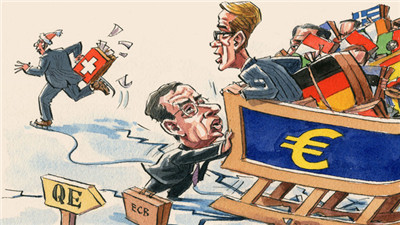(单词翻译:单击)
These are exciting times in European central banking. Last Thursday the Swiss National Bank suddenly terminated its successful peg to the euro. This week the European Central Bank is expected to announce its programme of quantitative easing. The SNB has embraced the risk of deflation from which the ECB wishes to escape.
欧洲的中央银行业迎来了激动人心的时刻。上周四瑞士央行(Swiss National Bank)突然取消了瑞士法郎兑欧元汇率上限这一成功的政策。本周欧洲央行(ECB)预计将宣布量化宽松计划。瑞士央行已经接受了欧洲央行希望逃脱的通缩风险。

The SNB’s decision was motivated, at least in part, by aversion to being caught up in the ECB’s QE programme. For Mario Draghi, the ECB president, the SNB’s decision is even helpful, since it weakens the euro. For many in northern Europe, however, the Swiss decision will be painful. It will remind them that they no longer enjoy the pleasures (and pains) of a strong currency. The Swiss can readily stop shadowing the euro; the Germans have been imprisoned in it.
瑞士央行作此决定的动机,至少有一部分是因为不愿被卷入欧洲央行的量化宽松政策。对于欧洲央行行长马里奥•德拉吉(Mario Draghi)来说,瑞士央行这一决定其实更有帮助,因为它会削弱欧元。然而对于许多北欧人来说,瑞士的决定将为他们带来痛苦。他们将需要谨记自己不再享受强势货币带来的愉悦(以及痛苦)。瑞士可以随时停止追随欧元,而德国已深陷欧元的囹圄之中。
The surprise decision created turmoil. By January 20, the Swiss franc had appreciated by 18 per cent against the euro, the currency of its principal trading partner. With core inflation near zero, deflation in Switzerland seems inevitable. So does a recession.
这一令人震惊的决定引起了市场动荡。到1月20日,瑞郎对欧元已经升值了18%,而欧元是瑞士主要贸易伙伴使用的货币。由于瑞士的核心通胀接近于零,瑞士发生通缩似乎已不可避免。还有一个不可避免的,是瑞士的经济衰退。
Why end a policy that had delivered such enviable stability? The obvious answer is that the SNB feared huge inflation if it remained pegged to the euro, particularly after QE began — and bigger losses on foreign currency assets the later the peg was dropped. Neither fear is compelling, as Willem Buiter, Citigroup chief economist, argues. It is possible to hold down the value of a currency one creates oneself forever. It is true that the SNB’s balance sheet is already large, at about 85 per cent of gross domestic product. But it had stabilised, and as Mr Buiter notes: “There is no technical limit on the size of the central bank’s balance sheet, in absolute terms or relative to GDP.”
瑞士央行的汇率上限政策已经实现了令人羡慕的稳定,为什么要结束呢?显而易见的答案是,瑞士央行担心如果仍保持瑞郎兑欧元汇率上限,可能会导致高通胀,尤其是量化宽松启动以后,它还担心越晚取消汇率上限,外汇资产损失越大。花旗集团(Citigroup)首席经济学家威廉姆•比特(Willem Buiter)认为,这两种担忧都缺乏说服力。一种货币永远可以随时压低自己设置的汇率。的确,瑞士央行的资产负债表规模已经非常大,大约相当于国内生产总值(GDP)的85%。但它已经稳定下来,而且比特指出:“从技术层面而言,无论是绝对规模,还是与GDP相比的相对规模,央行的资产负债表都不存在限制。”
Furthermore, the Swiss could have curbed inflationary dangers without abandoning the peg, for instance by increasing reserve requirements on banks. A sovereign wealth fund could have been set up to manage huge holdings of foreign assets.
而且瑞士原本无须放弃汇率上限就能遏制通胀危险,比如提高银行存款准备金率,或者可以建立一个主权财富基金来管理所持有的巨额外汇资产。
Even if a peg to the euro was no longer thought to be desirable, it could have been given up without going cold turkey. The government could instead have pegged the franc to a basket of currencies, which would have anchored its purchasing power while allowing it to move more freely against the euro.
即便瑞士央行认为兑欧元汇率上限不再可取,也不必突然彻底放弃。瑞士政府本可以代之以瑞郎盯住一篮子货币,这样在提高瑞郎兑欧元汇率自由度的同时,还稳定了其购买力。


